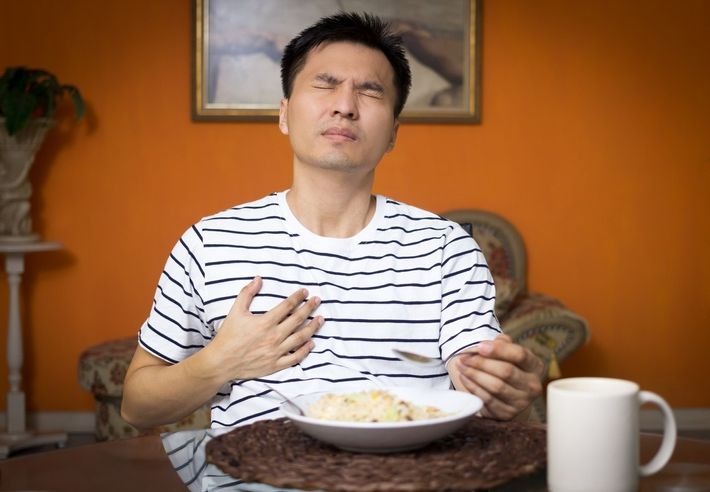Difficulty breathing after eating: what to do?
Caution : You must consult your doctor for your health. This page presents only a personal and alternative point of view which should not be considered as an attempt to prescribe medicine.
Breathing is a vital function of all living things.
In humans, it can be influenced by various situations.
For example, it may happen that you have difficulty breathing right after a meal.

This can be linked to several causes including an overly full stomach or digestive disease.
There are many solutions to remedy this problem which affects quite a few people today.
Avoid having a too full stomach
The larger the meal, the more it is savored with appetite until satiety.
However, the degree of satiety plays a major role in maintaining respiratory functions.
Indeed, each time the stomach is too full, it undergoes dilation.
It thus blocks the passage of air in the lungs as well as the movements of the diaphragm.
It can get worse in people with chronic respiratory diseases and cause great pain in the middle of the chest.
To avoid having difficulty breathing after a meal, you must avoid overeating and know how to stop in time.
As the Japanese and Chinese say so well, eat at 80% of your satiety.
Work your stomach
The difficulty in breathing after a meal can be caused by anxiety or stress accumulated during a day.
These suffocate the rib cage and this is felt right after filling the stomach.
Working the belly will allow you to increase your breathing range.
In other words, it is about practicing abdominal breathing in order to improve your oxygenation.
This technique mobilizes the diaphragm which, thanks to its precise movements, releases tension and regulates breathing.
Abdominal breathing can be done in any position, whether you are sitting, standing or lying down.
Adopt a good posture
The position of the body is an element that can facilitate or hinder respiratory functions.
If you adopt a posture that folds in on itself, it will be difficult for you to breathe well.
It is important to relax your muscles right after a meal.
Your posture should in no way cause the rib cage to close and affect pulmonary ventilation.
You should absolutely avoid standing straight.
To relieve difficulty breathing, adopt a sitting or standing position.
Check the support of your body, keep the sacrum in its proper position and especially lower the shoulders.
Drink water and move
To ensure both phases of breathing, the lungs need to be well humidified.
Therefore, breathing will be difficult if you don't drink enough water (dehydration).
This is usually seen in people who do not hydrate well during the day.
Eat less but drink hot broth with your meal.
This is what the Chinese and Japanese do, they start or end their meal with a bowl of broth.
Other specialists clearly recommend drinking a little water before eating.
You wake up the lungs while waiting for the consumption of your dish.
In addition, it is only a question of drinking water.
Alcohol and soft drinks cannot effectively help hydrate your body.
It is also recommended to make movements.
It is not a good habit to sit still for a long time after eating.
If you are inactive, you send a sign of rest to the organs.
Walk slowly for a few meters and sing if you can.
An Asian sage said: "take 100 steps after your meal".
In other words, taking a digestive walk is excellent for digestion.
Adopt healthy eating habits
The types of foods eaten can prevent the lungs from playing their full role.
In general, too solid foods are responsible for this discomfort, but there are also some liquids.
If the difficulty in breathing after meals is chronic, consider revising your diet.
It is recommended to focus on fiber intake such as vegetables, legumes, fruits and whole grains.
Also, consider limiting your intake of saturated fat from fresh creams and fatty meats EXCEPT if you're on a ketogenic diet (or eliminating all carbs).
Likewise, diversify your protein sources and increase your consumption of foods rich in Omega-3.
It is also advisable to opt for a fractional diet (several small meals) in order to limit breathing difficulties after each meal.
In conclusion, respiratory failure after a meal is a fairly common discomfort.
The solutions to remedy this lie mainly in the adoption of good eating habits.
To these, are added breathing exercises such as abdominal breathing which allow the lungs to regain their vitality.
Physical attitude such as digestive walking also plays a crucial role in relieving difficulty in breathing.
It should be remembered that alcohol and tobacco consumed after a meal are not at all beneficial to the body.
❤ The ultimate guide to breathing
Intermittent Breathing : Discover the method to quickly relieve your anxiety and chronic fatigue (positive effects from the first use).Read also :
Previous article : Difficulty breathing deeply due to stress: what to do?
Next article : Does breathing through the mouth distort the face?

